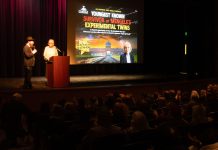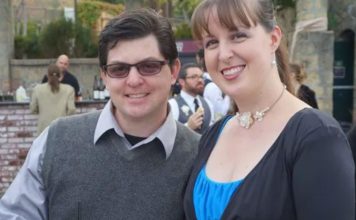Two parents, God, neighbors, community programs, awareness,
jobs: These are what residents and city officials see as the
solutions to Gilroy’s gang problem.
Two parents, God, neighbors, community programs, awareness, jobs: These are what residents and city officials see as the solutions to Gilroy’s gang problem.
But people acknowledge that unity is the key and that residents need to overcome the gulf that existed Thursday night between two Gilroy camps, both of which want to restore peace and save kids who have fallen into gangs.
One camp, gathered in the gym of El Portal Middle School in northeast Gilroy, was comprised of more than 180 mostly Hispanic, Spanish-speaking residents and community activists, including Councilman Peter Arellano and the family of Larry Martinez Jr., the 18-year-old who was gunned down Nov. 11 in a gang-related incident.
In the Senior Center less than a mile away, a diverse group of about 100 residents discussed the same issues, but the police and city officials led the conversation, after which Mayor Al Pinheiro implored folks to come together.
“There cannot be two fragments of the community. There has to be one. We live in one community,” Pinheiro said. “We’re not going to let 600 gang members take over 50,000 people.”
Art Barron, a meeting organizer and program coordinator at Proyecto Movimiento – a program run in connection with the Mexican-American Community Services Organization and the YMCA – agreed as residents’ voices echoed in the gym.
“We’re not trying to divide the community” he said. “What we want is for the community to come together and we are encouraging people to go to the city’s town hall meeting after this.”
Martinez’s mother, Monica Fernandez, made it clear that she understood this by attending both meetings and delivering the same heartfelt speech to both crowds.
“These aren’t bad kids. They are hurting kids,” Martinez said of Gilroy’s at-risk and troubled youth. “Our society is in danger of an outbreak of bloodshed … City officials, please give our children work or our money will be spent on their incarceration.”
Her son spent four years in custody and was released seven days before his death.
“If this wasn’t my son, it could’ve been yours,” Fernandez said. “I pray none of you ever have to feel this deep, deep pain that invades my heart.”
While she lives and runs a business in Dos Palos – though she always drove her three kids to Rod Kelly Elementary to ensure stability in their lives – Fernandez said her family came to Gilroy from Mexico in the early 1800s and acquired pieces of downtown real estate. She also spoke of her two daughters in college studying criminal justice and sociology.
“Had my son had a chance at life, he would’ve succeeded,” Fernandez said. “People can change.”
Her daughters’ understanding of the law and their connections helped the family obtain complaint forms from the police department after she said officers had refused following her son’s funeral. Police photographed cars in the funeral procession and cited and arrested attendees on probation or parole for associating with known gang members and wearing gang colors, among other things.
“The way our police are dealing with our children is wrong. They are being harassed,” Fernandez said. “Let us mourn in peace.”
Police Chief Denise Turner said she took Fernandez’s remarks to heart, and afterward she and Pinheiro approached Fernandez and assured her the department was only trying to ensure public safety at her son’s funeral.
Still, residents at both meetings said they had experienced uncooperative dispatchers and a general lack of response when they called to report fights or suspicious activity in their neighborhoods. At the Senior Center meeting, Sgt. Jim Gillio apologized and gave residents the direct line of the city’s principal gang officer, Sgt. Chad Gallicinao.
But residents acknowledged that police are not the only answer.
“We as parents need to teach our children to respect our homes,” resident Luciana Fuentes said at the gym meeting. “We need to make the effort to fight for our children.”
One parent stood up and advised others to know what certain symbols and colors represent. Councilman Arellano translated for another mother, who encouraged people to stand up and report criminal activity despite fear of retribution.
“We cannot let that happen. We have to speak up so we can help our own community,” Arellano said in English on the woman’s behalf.
Preventing the crime can cost more money.
One father, who said he has lived in Gilroy for 20 years and got in trouble as a youngster, said he wanted to enroll his daughters in the city’s gymnastics program but could not afford the $50 per hours it cost.
“He just needs some help,” Arellano said, translating.
Behind all these parents, representatives from the Center for Employment Training, MACSA, Gilroy High School, Rebekah Children’s Services and Community Solutions passed out flyers and pamphlets advertising their free services for children and families.
But there are some things only the family can do.
“El padre y la madre!” exclaimed one woman, stressing the importance of an intact family as square one when it comes to a child’s security. While she spoke, another community member drew four triangles on a blank poster, one each for school, church, parents and community.
“If kids do not get love at home, they will find it in the streets,” Arellano said after the woman spoke.
The councilman rushed over the the Senior Center meeting as soon as the gym gathering ended. There, a woman spoke about opening up her own home to area children who wait outside her house when she is not there, looking for a place to hang out with other kids.
“This is just the beginning,” Pinheiro said of Thursday night’s meeting at the Senior Center. “If we’re able to get 4,000 volunteers at the Garlic Festival, why not a couple hundred for this effort?”
At 3:30 p.m. Sunday, after the peace march that begins at 2 p.m. at 10th and Eigleberry streets, there will also be a prayer gathering at Sue’s Coffee, at the intersection of Fifth and Monterey streets, held by a group of bikers and area churches.
At the end of the second meeting, residents broke into groups and came up with the following solutions, which mirrored many of the other group’s suggestions:
-Mentor programs
-Sports programs outside of school that don’t require particular GPAs
-Social services
-Parenting classes and parent support groups
-More rules in school
-Strict oversight of Facebook and MySpace
-Early education
-Attending the city gang task force meetings
-Improving police attitudes
-Curfew enforcement
-Gang awareness forums
-Foot patrols
-Teaching teachers about gangs
-Communication within community with numbers for police and volunteer organizations
To contact police anonymously, call (408) 846-0330. To reach dispatchers, call (408) 846-0350.













